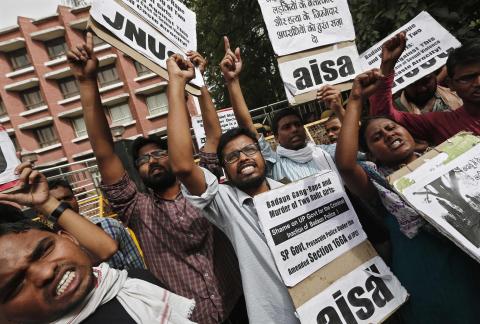Advertisement
New Delhi Seeks Report On Grisly Rape, Hanging Of Teens
LUCKNOW India (Reuters) - India's new home minister weighed in on Friday in a grisly case in which two teenage girls were raped and hanged from a tree this week, as public anger and political controversy over the attack gain momentum.
The case is one of the first challenges for Prime Minister Narendra Modi and his four-day-old government. It highlights the ongoing struggle to stem sexual violence in India, where a string of high-profile rapes has sparked nationwide protests and international criticism.
Home Minister Rajnath Singh asked the state government of Uttar Pradesh to submit a report on the attack, a ministry spokesman said.
Modi, a prolific Twitter user, has not yet commented on the killings in Uttar Pradesh, India's most populous state and a key political battleground. Modi's Hindu nationalist party swept 73 of the state's 80 parliamentary seats in its landslide general election victory.
The two cousins, from a low-caste community and aged 14 and 15, went missing from their home in a village in Uttar Pradesh's Budaun district on Tuesday evening when they went out to go to the toilet. The next morning, villagers found their bodies hanging from a mango tree in a nearby orchard.
Local police said a post-mortem confirmed that the girls, from the Dalit community, had been raped and died from the hanging. Three men - one a policeman - have been arrested over the attack and a search is under way for two other suspects.
Uttar Pradesh Chief Minister Akhilesh Yadav has ordered that the case be handled by a fast-track court "to ensure that the guilty are brought to book without the usual procedural delay", his spokesman Navneet Sehgal said.
Another Dalit teenage girl was gang-raped and strangled in the constituency of Yadav's father, Mulayam Singh Yadav, the leader of the regional Samajwadi party, on Thursday night, police said.
Mulayam Singh Yadav provoked outrage during the election campaign by saying about the death penalty for some rape cases: "Boys commit mistakes. Will they be hanged for rape?"
Mayawati, an opposition leader in Uttar Pradesh whose party enjoys widespread Dalit support, slammed the rape and hangings as evidence of the "jungle raj" that ran the state and failed to impose law and order.
A small crowd staged a protest against the killings outside the Uttar Pradesh state government's office in Delhi on Friday afternoon.
The poor state of women's safety in India has been under the spotlight since the gang-rape and murder of a 23-year-old student on a moving bus in the capital Delhi in 2012, which led to the introduction of tougher rape laws.
This week's case underlined how women from lower castes were particularly vulnerable, human rights activists said.
"Members of dominant castes are known to use sexual violence against Dalit women and girls as a political tool for punishment, humiliation and assertion of power," Divya Iyer, at Amnesty International India, said in a statement.
(Writing by Shyamantha Asokan; Editing by Douglas Busvine and Nick Macfie)



















Add new comment